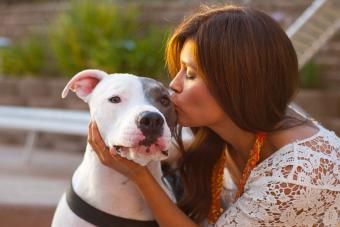
Pitbulls are one of the most popular and misunderstood dog breeds out there. While they have a reputation for being aggressive, they actually just need proper training and socialization to be great companions, just as all other breeds do. If you're wondering if a pitbull is right for your family, do your research to see if their attributes are right for your family, and don't fall for pitbull myths and misconceptions without learning about these fascinating dogs.
Myth No. 1: Pitbulls Are Nanny Dogs

The first pitbull myth is that they're nanny dogs. When you see them in their cute little outfits, with their big smiles, it's hard to imagine that these are the same dogs who were used for blood sports like bull baiting and later dog fighting. This doesn't mean that all pitbulls are dangerous or aggressive; in fact, many have been trained to be service dogs for people with disabilities.
Pitbulls are called nanny dogs because they are known to be very protective of their owners and children. They are very loyal and protective dogs and they will guard you with their life. Pitbulls were originally bred to fight, but now they are family pets that love to cuddle up with you on the couch and watch TV with you.
They make great companions for kids because they have a large amount of energy, so they can keep up with kids when they're running around. They also need a lot of exercise, so taking them for walks or playing fetch is perfect for them. Pits being called nannies should not be taken to mean they should watch your child while you aren't around, however. Rather, allow children to play with a well-mannered pit, but don't expect them to babysit for you. Pitbulls are still dogs, and although they are highly tolerant and very loving, they require supervision themselves.
Myth No. 2: Pitbulls Have Locking Jaws
This myth probably stems from the fact that pitbulls have a reputation for being very strong, and it's easy to imagine that they must also have strong jaws. However, this isn't true at all: Pitbulls don't have locking jaws. In fact, there is no such thing as a "locking jaw" in a healthy dog.
According to some studies conducted by animal behaviorists and veterinarians, they may actually be less likely to bite than some other breeds. Even if a pitbull does bite, they don't have the capacity to "lock" their jaws. When any dog bites, their behavior determines when they let go.
Pitbulls were originally bred for their "gameness," meaning their willingness to persist in the face of pain or aggression. This trait likely served as a survival trait for fighting dogs a century ago, but it is definitely not something any responsible breeders of pit-type dogs encourages today. The pit's gameness is likely the origin of the "lockjaw" myth, however, as some dogs refused to let go after they attach.
Also, some dogs are more likely than others to apply maximum force when they bite something because of their genetics. These dogs tend to be larger breeds with strong jaw muscles and large heads, like pitbulls. But even small dogs can apply maximum force if they want to. Many small dogs are very aggressive when it comes to protecting their owners and territory, so they can be equally as dangerous as a pitbull.
Myth No. 3: Pitbulls are More Aggressive than Other Breeds

Another common pitbull myth is that they are inherently aggressive toward people. This does not appear to be the case, however. As an example, a recent study of dog behavior and aggression published in the Journal of Applied Animal Behavior Science found that pitbulls only scored higher than average on measures of aggression directed toward other dogs, when dogs were evaluated on a standard test called the Canine Behavioral Assessment and Research Questionnaire.
The study identified four key factors that contribute to aggression: genetics, early socialization, the owner's behavior, and the owner's treatment of the dog. The study also found that dogs who were not properly socialized as puppies were more likely to exhibit aggressive behavior as adults. This finding supports previous research that has shown dogs who are neglected or abused by their owners are much more likely to become aggressive than those who are treated well.
Myth No. 4: Most Dog Attacks Involve Pitbulls
It's easy to see why people assume that pitbulls are the dogs most likely to cause maulings and deaths. Pitbulls don't have a monopoly on aggression and violence. All dogs can bite. In fact, according to statistics from the CDC, fewer than 1/3 of reported dog bites per year were attributable to pitbulls, in comparison with other breeds such as Dalmatians and Pekingese dogs.
While pitbulls stood out in the data, it certainly isn't the case that the majority of dog bite incidents involved pit-type dogs. Also, in most circumstances, dog bite behavior results from poor socialization and training. Every dog can become aggressive under the right conditions. This is why you need to be extremely careful in how you socialize and train your dog from an early age.
Breed-specific Legislation

Breed-specific legislation is when a city or state passes a law banning or otherwise restricting the ownership of certain breeds of dogs, regardless of whether the dog has ever acted aggressively or bitten someone. The most common targets of breed-specific legislation are pitbull-type dogs, Rottweilers, German Shepherds, Chow Chows, and Doberman Pinschers.
The problem with breed-specific legislation is that it assumes all dogs of one breed are inherently dangerous and cannot be trained to become good pets. It also assumes that owners of these breeds will not take the time or effort to train them properly. However, there are many people who own these breeds who have never had an issue with their dogs biting anyone or acting aggressively toward humans or other animals.
Breed-specific legislation creates financial hardships for those who love these breeds because they often have higher veterinary bills, homeowner's insurance, and general fees than other types of dogs. Some cities have even gone so far as to ban people from adopting pitbulls from shelters.
Do Your Own Research
It's important to educate yourself about these myths so you don't fall for them. If you've been around pitbulls or any dogs for that matter, the myths about them are probably pretty obvious to you. Even if this information is obvious to you, it isn't so obvious to everyone else, and that's where the problem lies. When people hear these myths over and over again, even if they're wrong, they begin to believe them, and that can have dangerous consequences for both dogs and humans alike.
The truth is that well-socialized, trained pitbulls probably aren't intrinsically any more dangerous than your average dog when it comes down to biting behavior: all dogs are unpredictable. The important thing is to make sure your pitbull has proper socialization opportunities while they're young so they can learn how to best interact with their environment.
All Dogs Can Be Dangerous if Not Raised Properly
Remember, pitbulls are just dogs. They deserve to be treated with love. It's also important for you to educate yourself about these myths and misconceptions so that you can help others see past them, as well. If a friend tells you that they want a pitbull because their grandpa had one and he was the best nanny ever? Or if your neighbor insists that all pit bulls have locking jaws? You can help the pitbull breed by spreading awareness throughout your community.







